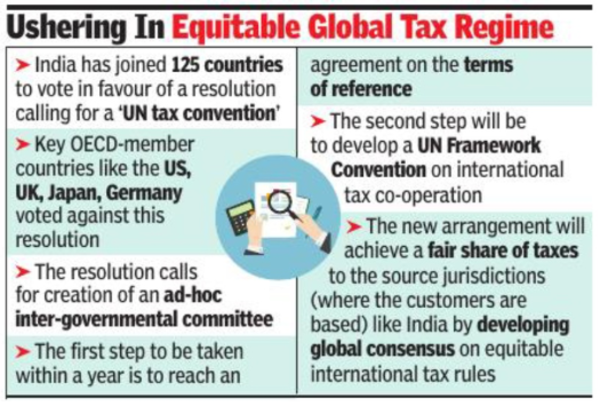[ad_1]
Tax experts in India and global think tanks view it as a historic move that will shift the reins of decision making from OECD, whose 38 members are dominated by rich countries, to a more equitable platform.
The resolution was passed in the ratio of 125:48 at the UN General Assembly in New York on Wednesday. Key OECD-member countries such as the US, UK, Netherlands, Switzerland, Japan, France, Germany voted against this resolution. In addition to African nations who had tabled the resolution, India, with other BRIC countries – Brazil, Russia and China – voted in favour.

The resolution calls for creation of an ad-hoc inter-governmental committee of no more than 20 member states (taking into cognizance gender and regional balance). OECD’s Inclusive Forum, which has dealt with a range of issues, is not an inter-governmental body, but brings OECD and non-OECD members together in a collaborative initiative.
The first step to be taken within a year is to reach an agreement on the terms of reference, and the second step will be to develop a UN Framework Convention on international tax co-operation.
The Tax Justice Network, a think-tank, has welcomed the passing of the resolution. It had added that the world would lose nearly $5 trillion to tax havens over the next decade unless the UN tax convention was adopted.
“In practical terms, what the new arrangement will achieve is a fair share of taxes to the source jurisdictions (where the customers are based) like India, as indeed to the developing world by developing global consensus on fair and equitable international tax rules. The international tax rules, as of now, are generally biased towards capital-exporting countries; the OECD perspectives and their commentaries, which have this inherent bias, will be much less relevant, in the new scheme of things,” said Pramod Kumar, former vice president at the income-tax appellate tribunal.
A wide range of issues from aggressive tax avoidance and evasion, illicit financial flows, recovery of stolen assets, and even taxation of the digital economy (taking cognizance of the views of source countries) could be included in the terms of reference. The OECD-led forums have done work on the ‘Two-Pillar solution’. Pillar One deals with taxation in a digital economy and granting of taxing rights and allocation of profits of MNEs to countries where the customer base is. Pillar Two prescribes a global effective minimum tax rate.
[ad_2]
Source link










More Stories
India’S Growth Forecast: S&P ups India’s FY’24 growth forecast to 6.4% on robust domestic momentum
India to remain fastest-growing major economy, but demand uneven: Poll
Jack Ma: Jack Ma gets back into business with ‘Ma’s Kitchen Food’